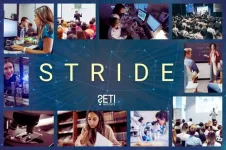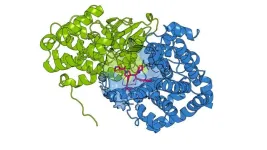(Press-News.org) SETI Institute Awards Education Grant through the STRIDE Program
October 1, 2024, Mountain View, CA – The SETI Institute awarded its first education grant through its Support Technology, Research, Innovation, Development and Education (STRIDE) program. The grant supports a new project called Encountering Stars in an Inflatable Planetarium, which will offer immersive astronomy and astrobiology experiences for elementary and middle school students in low-income areas and high school and adult audiences interested in STEM-related experiences. The program also includes a training workshop for K-12 teachers and community college volunteers. It aims to encourage students in high school to start a STEM career pathway by participating in the Evergreen Valley College (EVC) Dual Enrollment Program.
The SETI Institute established the $500K STRIDE fund for SETI Institute researchers and EOC (Education, Outreach, and Communications) professionals to develop innovative research and education proposals. In July 2024, the SETI Institute announced the first STRIDE science grants.
Dr. Margaret Race leads this project with Dr. Celso Batalha at Evergreen Valley College (EVC) in San Jose, CA. Together, they will recruit and train EVC students to bring the inflatable planetarium to schools and other sites. Dr. Dana Backman of the SETI Institute will develop the training workshop for teachers and EVC students.
"Dr. Race has been a passionate advocate for STEAM education throughout her career in planetary protection, volunteering her time in classrooms and libraries to engage young learners," said Ms. Pamela Harman, Director of Education at the SETI Institute. "This STRIDE award enables her to bring a planetarium program to students and educators, inspiring them with views of the night sky and our research stories."
STRIDE grants include funding for basic research, technology development, prototyping, equipment and instrumentation, field expedition work, education program development, materials, hardware, software, and more. Last year, the SETI Institute announced a philanthropic gift of $200M from the estate of Franklin Antonio, a visionary supporter and catalyst of the work of the SETI Institute for more than 12 years. Co-founder of communications chip company Qualcomm, Antonio left an extraordinary legacy to enable breakthrough science in the search for intelligent life beyond our world. The Franklin Antonio Bequest funds the STRIDE program, and the SETI Institute expects to solicit it annually.
The STRIDE grant will fund Encountering Stars for one year.
About the SETI Institute
Founded in 1984, the SETI Institute is a non-profit, multi-disciplinary research and education organization whose mission is to lead humanity’s quest to understand the origins and prevalence of life and intelligence in the universe and to share that knowledge with the world. Our research encompasses the physical and biological sciences and leverages expertise in data analytics, machine learning and advanced signal detection technologies. The SETI Institute is a distinguished research partner for industry, academia and government agencies, including NASA and NSF.
Contact information
Rebecca McDonald
Director of Communications
SETI Institute
rmcdonald@seti.org
END
SETI Institute awards education grant through the STRIDE program
The grant supports Encountering Stars in an Inflatable Planetarium, which will offer immersive science experiences for elementary and middle school students in low-income areas and high school and adult audiences interested in STEM-related experiences.
2024-10-01
ELSE PRESS RELEASES FROM THIS DATE:
NYU Historian Jennifer L. Morgan wins 2024 MacArthur “Genius Grant”
2024-10-01
New York University historian Jennifer L. Morgan, whose work focuses on the institutionalization of race-based slavery in early America and the Black Atlantic, has been named a 2024 MacArthur Fellow by the John D. and Catherine T. MacArthur Foundation.
MacArthur Fellows are recipients of the foundation’s “genius grants,” who each receive $800,000 over a five-year period to pursue intellectual, social, and artistic endeavors.
“The 2024 MacArthur Fellows pursue rigorous inquiry with aspiration and purpose,” says MacArthur Fellows Director ...
Research in 4 continents links outdoor air pollution to differences in children’s brains
2024-10-01
Outdoor air pollution from power plants, fires and cars continues to degrade human, animal and environmental health around the globe. New research shows that even pollution levels that are below government air-quality standards are associated with differences in children’s brains.
A University of California, Davis, research team systematically analyzed 40 empirical studies, the majority of which had found that outdoor air pollution is associated with differences in children’s brains. These differences include volumes of white matter, which is associated with ...
UTA physicists explore possibility of life beyond Earth
2024-10-01
Are there planets beyond Earth where humans can live? The answer is maybe, according to a new study from University of Texas at Arlington physicists examining F-type star systems.
Stars fall into seven lettered categories according to their surface temperature. They also differ in other factors including mass, luminosity, and radius. F-types are in the middle of the scale, hotter and more massive than our sun. F-type stars are yellowish white in color and have surface temperatures of more than 10,000 degrees.
A habitable zone (HZ) is the distance from a star at which water could exist on orbiting planets’ surfaces. In the research led by doctoral student Shaan Patel ...
Seeing double: Designing drugs that target “twin” cancer proteins
2024-10-01
LA JOLLA, CA—Some proteins in the human body are easy to block with a drug; they have an obvious spot in their structure where a drug can fit, like a key in a lock. But other proteins are more difficult to target, with no clear drug-binding sites.
To design a drug that blocks a cancer-related protein, Scripps Research scientists took a hint from the protein’s paralog, or “twin.” Using innovative chemical biology methods, the scientists pinpointed a druggable site on the paralog, and then used that knowledge to characterize drugs that bound to a similar—but more difficult to detect—spot on its twin. Ultimately, they found drugs ...
Fierce names Insilico Medicine as one of its Fierce 50 Honorees of 2024
2024-10-01
Cambridge, MA, Sept. 26, 2024 –Insilico Medicine, a clinical-stage generative AI-driven drug discovery company, announced today that Fierce Life Sciences and Fierce Healthcare have named Insilico Medicine as one of 2024’s Fierce 50 honorees. The Fierce 50 showcases 50 individuals and companies driving advancements in medicine, fostering innovation and shaping the future of biopharma and healthcare.
“The annual Fierce 50 special report highlights individuals and companies that are driving progress in the pharmaceutical, healthcare and biotechnology industries,” said Ayla Ellison, Editor-in-Chief of Fierce Life Sciences and Healthcare. “These 50 outstanding ...
Cleveland Clinic researchers build first large-scale atlas of how immune cells react to mutations during cancer immunotherapy
2024-10-01
A Cleveland Clinic-led research collaboration between Timothy Chan, MD, PhD, Chair of Cleveland Clinic’s Global Center for Immunotherapy, and Bristol Myers Squibb has published the most comprehensive overview to date of how the immune system reshapes tumor architecture in response to immune checkpoint therapy.
The eight-year study, published in Nature Medicine, outlines how cancer immunotherapy induces tumor recognition through neoantigens to reshape the tumor ecosystem. Neoantigens are small peptides produced when cancer cells mutate and are a primary marker for the immune system to recognize cancer cells as different ...
Pioneering quantum computer research continues in Baden-Württemberg
2024-10-01
Utilizing the potential of quantum computers and achieving a real advantage for practical applications — this goal is being pursued worldwide. In Baden-Württemberg, the Competence Center Quantum Computing Baden-Württemberg (KQCBW) has dedicated itself to this goal over the past four years. Great progress has been made in various areas of quantum computing in successful joint projects. The success of the KQCBW is now to be continued and the unique quantum computing ecosystem in the state further expanded.
The KQCBW will be continued in a ten-month transfer project ...
Discovery of orbital angular momentum monopoles enables orbital electronics with chiral materials
2024-10-01
In traditional electronics, information is transferred using the charge of electrons. However, future technologies may rely on a different property of electrons—their intrinsic angular momentum. Historically, the focus has been on electron spin, a form of build-in angular momentum that creates a magnetic moment, as the leading candidate for next-generation devices. Now, researchers are exploring the potential of orbitronics, a field that utilizes the angular momentum of electrons generated as they orbit the atomic nucleus. Orbitronics holds great promise ...
New mouse models offer valuable window into COVID-19 infection
2024-10-01
LA JOLLA, CA—Scientists at La Jolla Institute for Immunology (LJI) have developed six lines of humanized mice that can serve as valuable models for studying human cases of COVID-19.
According to their new study in eBioMedicine, these mouse models are important for COVID-19 research because their cells were engineered to include two important human molecules that are involved in SARS-CoV-2 infection of human cells—and these humanized mice were generated on two different immunologic backgrounds. ...
Antibodies in breast milk provide protection against common GI virus
2024-10-01
A study led by researchers at the University of Rochester Medical Center found that breast milk provides protection against rotavirus, a common gastrointestinal disease that causes diarrhea, vomiting and fever in infants. Babies whose mothers had high levels of specific antibodies in their breast milk were able to fend off the infection for a longer period than infants whose mothers had lower levels. The findings are expected to drive future research to improve infant health through optimized breastfeeding practices.
Published in the Journal of Clinical Investigation and funded by the Bill and Melinda Gates Foundation, the study also ...
LAST 30 PRESS RELEASES:
Natural selection operates on multiple levels, comprehensive review of scientific studies shows
Developing a national research program on liquid metals for fusion
AI-powered ECG could help guide lifelong heart monitoring for patients with repaired tetralogy of fallot
Global shark bites return to average in 2025, with a smaller proportion in the United States
Millions are unaware of heart risks that don’t start in the heart
What freezing plants in blocks of ice can tell us about the future of Svalbard’s plant communities
A new vascularized tissueoid-on-a-chip model for liver regeneration and transplant rejection
Augmented reality menus may help restaurants attract more customers, improve brand perceptions
Power grids to epidemics: study shows small patterns trigger systemic failures
Computational insights into the interactions of andrographolide derivative SRJ09 with histone deacetylase for the management of beta thalassemia
A genetic brake that forms our muscles
CHEST announces first class of certified critical care advanced practice providers awarded CCAPP Designation
Jeonbuk National University researchers develop an innovative prussian-blue based electrode for effective and efficient cesium removal
Self-organization of cell-sized chiral rotating actin rings driven by a chiral myosin
Report: US history polarizes generations, but has potential to unite
Tiny bubbles, big breakthrough: Cracking cancer’s “fortress”
A biological material that becomes stronger when wet could replace plastics
Glacial feast: Seals caught closer to glaciers had fuller stomachs
Get the picture? High-tech, low-cost lens focuses on global consumer markets
Antimicrobial resistance in foodborne bacteria remains a public health concern in Europe
Safer batteries for storing energy at massive scale
How can you rescue a “kidnapped” robot? A new AI system helps the robot regain its sense of location in dynamic, ever-changing environments
Brainwaves of mothers and children synchronize when playing together – even in an acquired language
A holiday to better recovery
Cal Poly’s fifth Climate Solutions Now conference to take place Feb. 23-27
Mask-wearing during COVID-19 linked to reduced air pollution–triggered heart attack risk in Japan
Achieving cross-coupling reactions of fatty amide reduction radicals via iridium-photorelay catalysis and other strategies
Shorter may be sweeter: Study finds 15-second health ads can curb junk food cravings
Family relationships identified in Stone Age graves on Gotland
Effectiveness of exercise to ease osteoarthritis symptoms likely minimal and transient
[Press-News.org] SETI Institute awards education grant through the STRIDE programThe grant supports Encountering Stars in an Inflatable Planetarium, which will offer immersive science experiences for elementary and middle school students in low-income areas and high school and adult audiences interested in STEM-related experiences.





